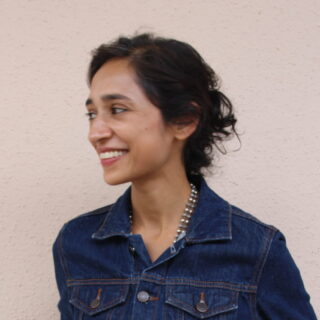How one couple’s vision laid the foundation for Pakistani cultural life in Atlanta
Video courtesy of Daniel Cooley.
It’s Friday night at the Brook Hollow Village Shopping Center on Jimmy Carter Boulevard in Norcross. The sound of Pakistani music fills the air. Women dressed in shalwar kameez, young men and older gentlemen, as well as children of all ages are wandering in and out of the three Pakistani restaurants in the shopping center. Several people are sitting at picnic tables and sipping chai from small white ceramic cups outside of the brightly lit Dil Bahar Café. There’s even a supporter of a Pakistani political party passing out flyers for an upcoming rally in Decatur Square.
If you shielded the giant parking lot and the cars zooming down Jimmy Carter Boulevard from your vision, you might, just for a second, think you were at a plaza in Pakistan.
Brook Hollow Village Shopping Center is Atlanta’s closest thing to a “Little Pakistan.” The relatively small strip mall located less than one half a mile from the I-85 junction not only has the restaurants Karachi Broast & Grill, Kabab King, and Dil Bahar Café, it also has the dessert and candy store Global Paan House, and once had Spice House – a Pakistani owned grocery store. The development of the strip mall into a de facto “Little Pakistan” has happened as the community in Georgia grew more than tenfold over the last four decades, from around 1,200 in 1990 to over 13,000 in 2020. Most of that growth occurred in the metro Atlanta area, specifically in Gwinnett and DeKalb Counties.
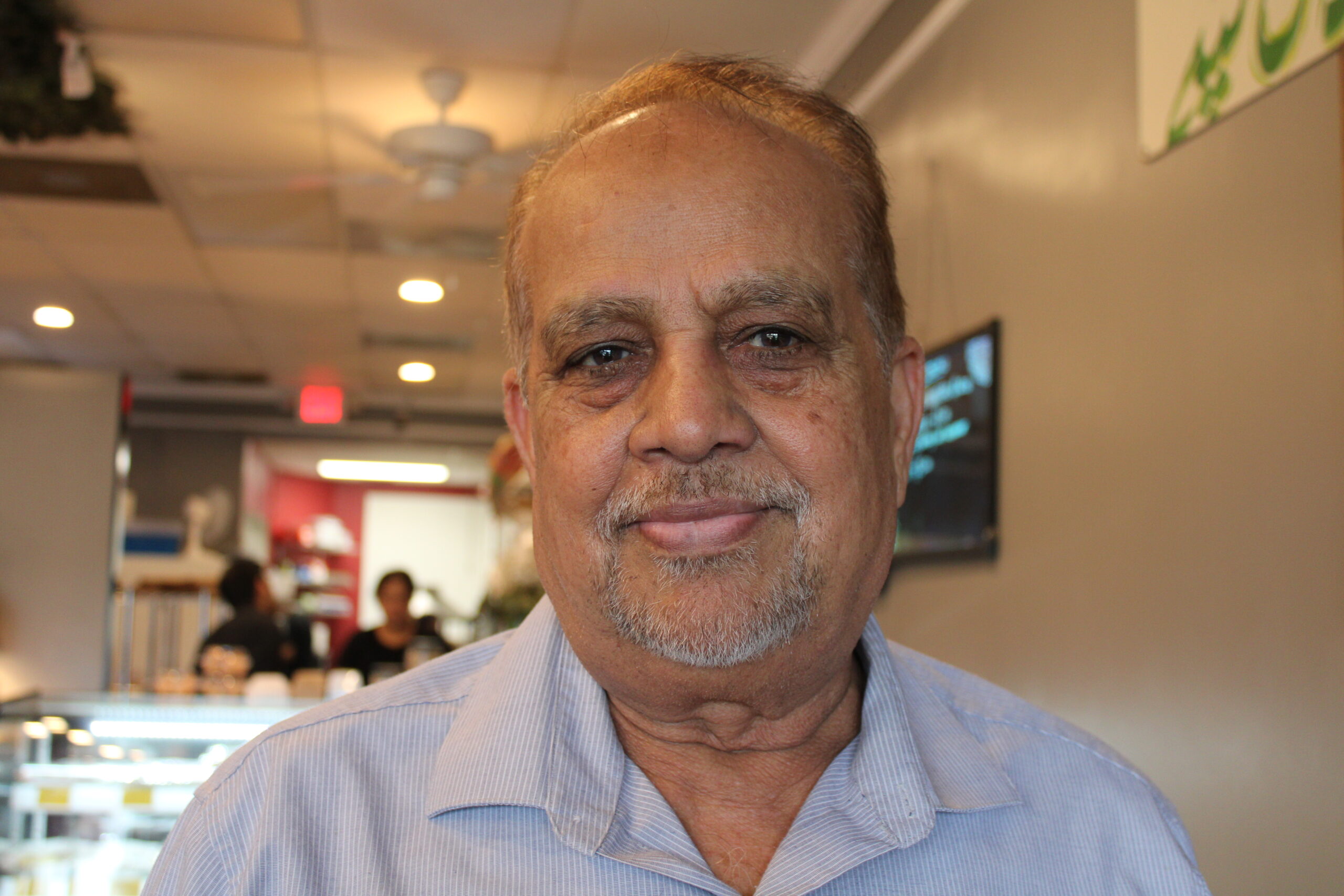
Azhar Mehmood, co-owner of Dil Bahar Cafe, on a Saturday night at the cafe in the Brook Hollow Village Shopping Center on Jimmy Carter Blvd in Norcross. Courtesy of Sophia Qureshi
When Azhar Mehmood moved to Metro Atlanta in 1989, he says there was no place he could get the dishes he and his wife cooked at home, such as Pakistani-style korma, biryani, and haleem. The community was growing and still, he says, “There was no Pakistani restaurant here.”
One of the main gathering places for the community was Al-Farooq Masjid, a mosque founded by local Pakistani and Arab immigrants in 1980 in downtown Atlanta. The other was the annual Pakistan Independence Day celebration at the Gwinnett County’s Gas South Convention Center. Other than that, the then relatively small community gathered in rented event halls or in each other’s homes.
Mehmood came to the U.S. in 1989 by way of a Pakistan Day festival hosted by the Pakistan embassy in Washington, D.C. He was among the musicians the embassy brought to perform at the Washington Monument. One of his music teachers lived in Atlanta and Mehmood decided to move to Norcross to stay close to him.
During his first years here, he worked a mix of odd jobs while also still performing at local community fundraisers as well as live concerts around the U.S. But the income wasn’t stable, so Mehmood and his wife, Farah, decided to open a business, one that accommodated his two small children at the time.
“We did not believe in babysitters, so we had a choice of either going into a gas station business or some other business where we could bring our kids there,” Farah said.
Farah had just quit her job and had her third child. Encouraged by their friends’ love of their home-cooking and her own passion for food, she floated the idea of a restaurant to Azhar.
“I told my husband, let’s go and start a restaurant. He looked at me and said ‘are you crazy? And I said, we can do it you know. And, we did it.”
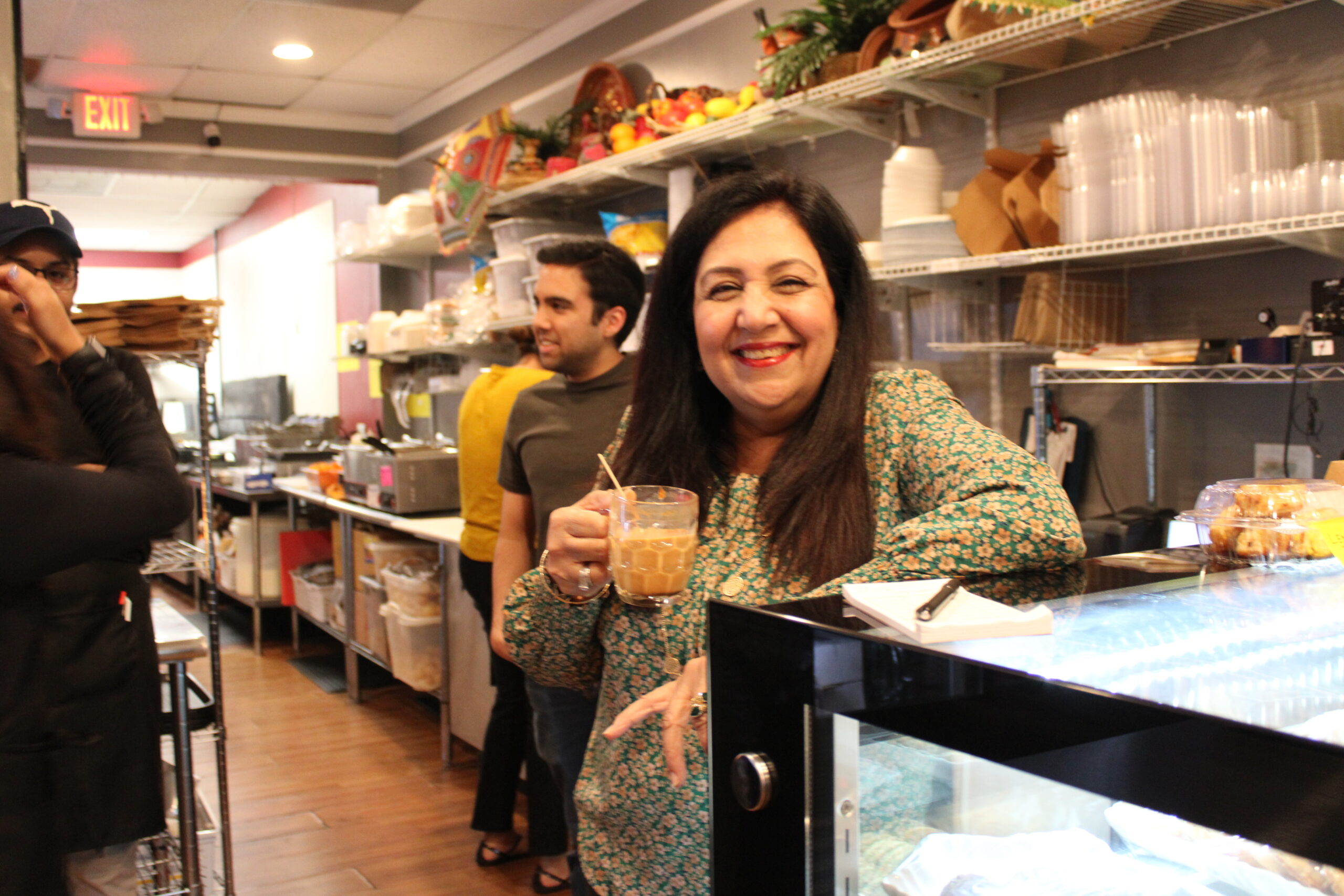
Farah Mehmood, co-owner of Dil Bahar Cafe and wife of Azhar Mehmood, enjoys a cup of chai at Dil Bahar Cafe. Courtesy of Sophia Qureshi
Encouraged by their friends’ love of their home cooking and a desire to fill a void in the market, the Mehmood couple decided to venture into the restaurant business.
In 1994, the couple opened Mughals, the Atlanta area’s first Pakistani restaurant. It was a small, bare-bones operation located in the Cedar Village Shopping Center in Norcross. To keep costs low, steaming bowls of classic Pakistani dishes, including nihari, haleem, and paya, were served in Styrofoam containers of different sizes along with fresh naan wrapped in foil. The response, Azhar Mehmood said, was crazy: “Oh my god. The first day when I opened the restaurant it was 150, 200 people. Because nobody used to make those kinds of foods. They were waiting for those.”
After running the restaurant for four years, the Mehmoods decided to move back to Pakistan.
“We were homesick,” said Azhar. But the Pakistan they returned to had changed. “I thought it was going to be the same conditions back there like we left 10 years ago.” But it wasn’t. After two years, they returned to Atlanta. The Pakistani community was growing and there was an obvious need for more food options and event spaces, and Azhar and Farah responded. They opened and expanded businesses almost in lock step with the needs, running the restaurant Silver Spoon in Duluth, Sherwood Event Hall in Sandy Springs, and the Zafran Kitchen catering company.
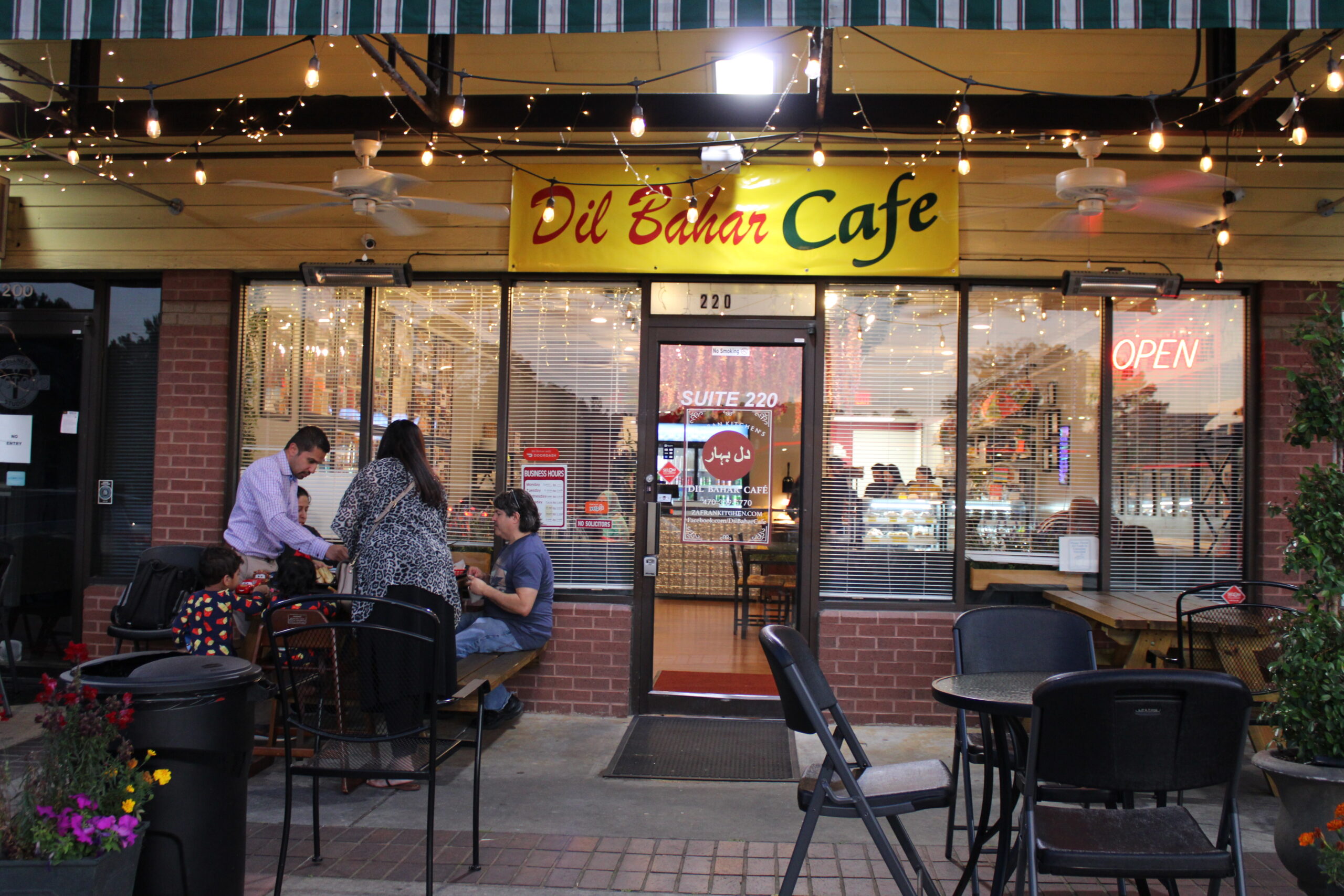
Dil Bahar Café in Norcross. Located in the Brook Hollow Village Shopping Center on Jimmy Carter Boulevard, the restaurant serves up a variety of Pakistani delicacies. Courtesy of Sophia Qureshi
These days, the couple spends most of their time at Dil Bahar Café. They’re nearing retirement age, but rather than sit at home, Azhar says they opened the cafe because they wanted to spend their time surrounded by friends and family and devoting their time to their passions – food and music. “We need to be with people,” said Farah. “It’s fun.”
One wall of the cafe is covered with pictures charting the family’s journey in Atlanta: flyers of Azhar’s concerts in different parts of the metro area, their children eating from the restaurant buffet, the Pakistan cricket team eating at Mughals during the 1996 Olympics, and old news clippings about their restaurants. The opposite wall lists the cafe’s specials, including kachori, chicken boti rolls, and falooda. Behind the counter, three of Azhar and Farah’s grown children manage the orders when they have time off from school or their day jobs while Farah runs the kitchen.
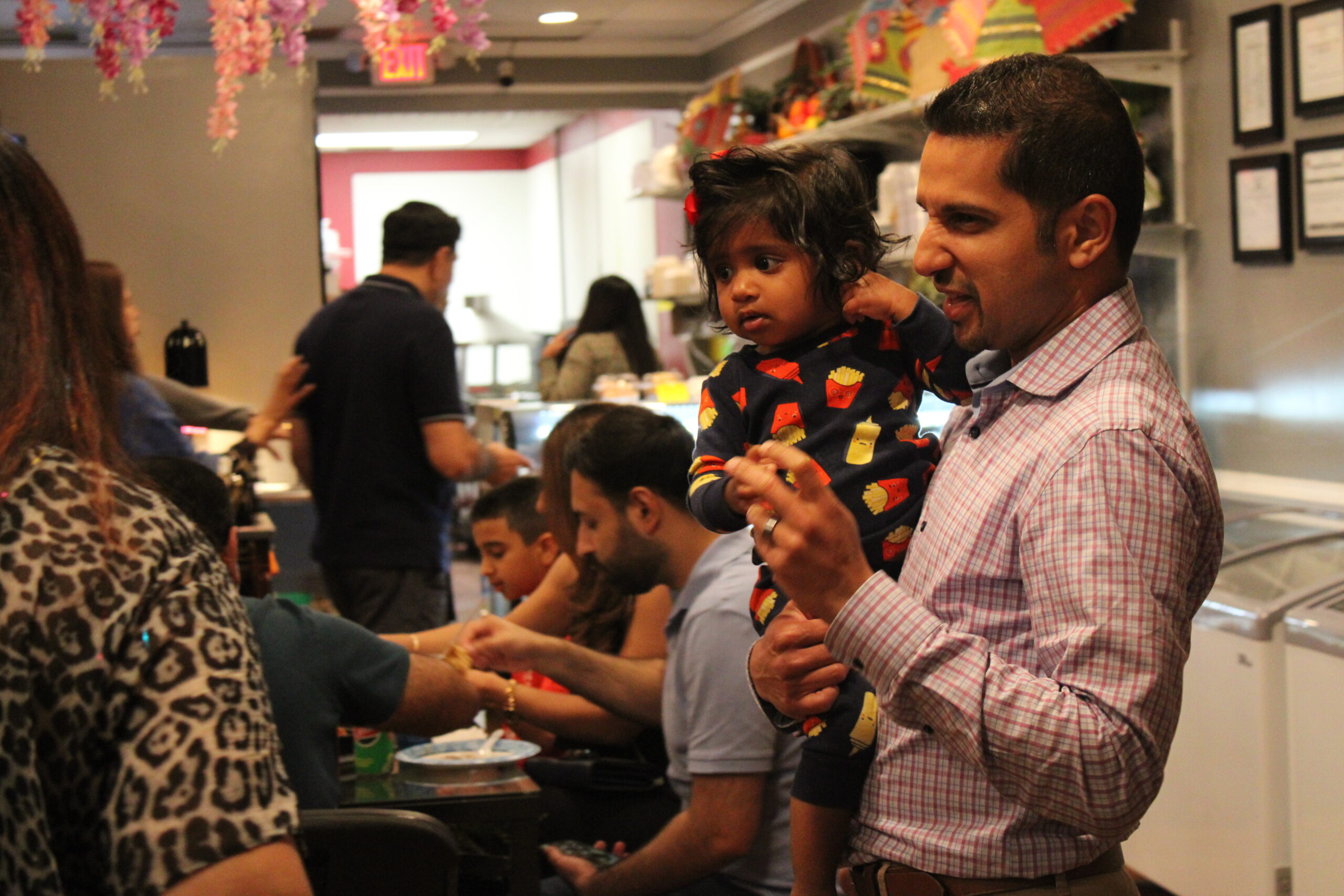
Asim Fareedudin dances with his daughter Layla at Dil Bahar Cafe on a Saturday night. Courtesy of Sophia Qureshi
The cafe has become not just a place for chai and chatting with fellow Pakistanis, it’s become a go-to spot for live Pakistani music. On Friday and Saturday nights, when Azhar isn’t greeting customers, he’s also behind the counter. But instead of taking orders, he has a microphone in his hand, singing traditional Pakistani ghazals as well as contemporary Pakistani pop songs. Some customers continue their conversations while Azhar’s voice provides the soundtrack for their evening. Many sing along to tunes they recognize from home. Others even dance with their small children. And everyone eats familiar food and enjoys the company of their growing community in their new home.
| Glossary | |
|---|---|
| Shalwar Kameez | Traditional attire worn by both women and men in parts of Pakistan. |
| Ghazals | Arabic poems typically about love, loss, or desire. |
| Korma | A dish consisting of meat or vegetables braised with yogurt, water or stock, and spices to produce a thick sauce or gravy. |
| Biryani | One-pot dish in which meat, seafood, or vegetables is layered with rice. |
| Haleem | A meat and grain stew typically made with wheat, barley, and lentils mixed into a spicy beef mixture. |
| Kachori | Deep-fried snacks filled with lentils. |
| Chicken Boti Rolls | Seasoned chunks of chicken wrapped in buttery flatbread. |
| Falooda | A cold dessert made with vermicelli, rose syrup, basil seeds, milk, and ice cream. |
About the Author
Sophia Qureshi writes about immigrant communities in metro Atlanta. She is the publisher behind 285 South, a weekly newsletter focused on the stories of immigrant communities in metro Atlanta.


